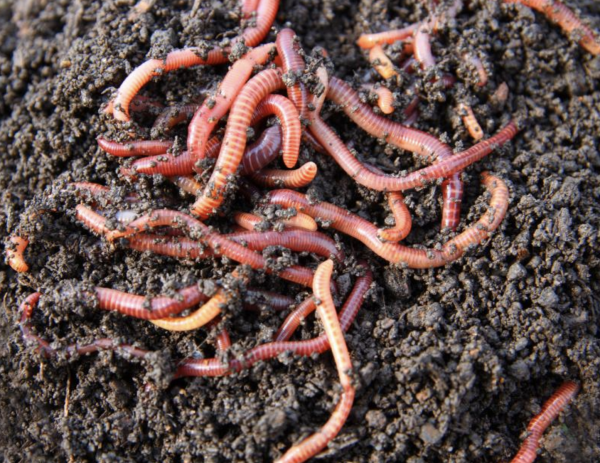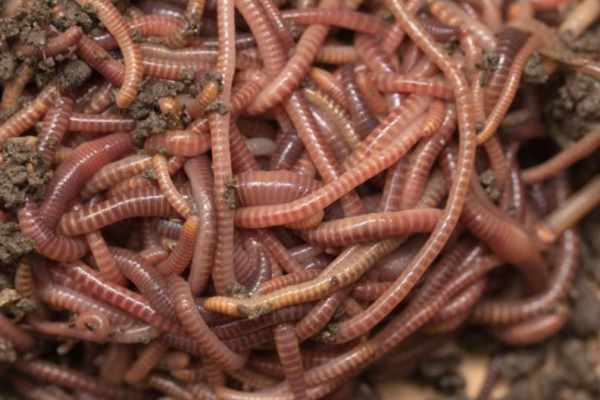With 34,000 different types, worms are truly exciting and amazing creatures to watch. These creeping animals are much older than dinosaurs, since they have been in existence for as long as 600 million years. They tend to move with the help of bristles. They have to keep their skin moist all the time in order to get oxygen from the air and breathe. This is precisely why worms search for damp environments and avoid sunlight because it may dry out their skin (in which case, worms won’t survive). Interestingly, they do not have any eyes, teeth, legs or lungs. Enough said! Now let’s dive deep into what do worms like to eat in general.
What Do Worms Eat in the Wild and in the Farm
Every day, they can actually eat their own body weight in food. In just one acre of soil, there can be as many as one million worms. What’s more, they can excrete 700 pounds of worm poop (castings) daily.
What makes these worms the best friend of a gardener is the fact that when they eat and digest a lot of organic waste, they excrete castings that are rich in nitrogen, phosphorus, calcium and potassium. Not only do these worm castings (humus) improve the soil structure of your garden, but they also improve its capability to store nutrients and water. No wonder, it makes lovely compost and a very good fertilizer for your garden soil and houseplants.

Red Wigglers/Photo © Mik122. Image Source: EcoParent
Worms can happily consume just about any decaying organic waste despite the fact they lack teeth. In other words, anything that was once living becomes a ready food supply for these tiny critters. For eating, however, they tend to direct their food by means of a liplike extension over their mouth.
Even though worms eat both animal and plant matter, they are aptly described as detritivores (which means animals eating decomposed organic matter).
As soon as you discard decaying plant matter, worms tend to wait until tiny tasty microbes start growing on the surface of this organic food. As these microbes begin to accumulate, worms begin feeding on such microorganisms and get their nutrition out of them.
Generally, if a farm becomes too wet, this is not something worms like a lot. Therefore, it is better not to throw away fruit and vegetable waste all at once. Besides, putting a lot of scraps also creates nitrogen, which is dangerous for these creatures.
In order to make up for the wet farm environment, it is better to add some shredded paper, crushed egg shells, coco peat, chopped cardboard or leaves.
The size of the foodstuff is really important for worms. It will take a lot of time for your worms to digest a fruit that is in big chunks. However, if you chop it down into smaller bits and pieces, that would become absolutely irresistible for them.
Apart from the organic waste, worms also need sprinkle of sand, which helps them grind up their meal.
With vegetable and fruit scraps (nitrogen- or protein-rich source), you should always add a good portion of BROWNS (carbohydrates- or carbon-rich source) like dry leaves, paper egg cartons and junk mail. In this way, the worm farm will have right carbon-nitrogen ratio.

Image Source: Rutgers
Since worms can eat any kind of leftover vegetable scraps and peelings, you can give them tomatoes, potato peels, cabbage or lettuce leaves, grass clippings and dead roots.
It is recommended that you must always supplement low-nutrient meal with some nitrogen-rich feeds like walnut shell, mashes, cotton seed, or grains.
Generally, you should be wary about the right amount of protein balance for the total feed of worms. This protein content should be around 9 to 15 percent. If the protein content is below nine percent (which is too low), the worm beds will become too acid. As a result, the eggs may not hatch and worms can’t grow well. Likewise, if protein content is too high, it will speed up the decaying process of the food which will turn the beds too hot.
It is always better to feed worms regularly once a week.
Some of the nitrogen-rich veggie wastes (called GREENS) include carrot tops, mushrooms, cauliflower stalks, spinach, broccoli, lettuce, eggplant, potato skins, carrot peelings, and kale.
In fruits, worms seem to prefer eating foods (if they are broken down into smaller pieces) like berries, apple cores, watermelon, banana peels, pumpkins, avocados, bell peppers, grapes, cantaloupe, zucchini, squash, and mango.
Besides, following are some of the foods that worms usually eat in moderate amounts: tea bags, tea leaves, coffee, grounds, coffee filters, pasta or rice (without oil).
However, while adding coffee grounds, you need to be careful about the right moisture balance because coffee grounds can dry out your bin pretty quickly.
As far as animal manures are concerned (you must always pre-compost these manures before giving them to worms), some of the famous ones come from horses, cattle and rabbits.
Even though almost any kind of veggie waste can get your worms into a ‘feeding frenzy’ mood, yet there are some foods you should always avoid giving them. Spicy (like hot peppers) or salty foods can be toxic for worms. Likewise, you should not give them dairy foods, foods with preservatives, garlic, citrus products, glass, metal or plastic products. Pineapple also kills these tiny creatures due to an enzyme which is why you should also avoid it. You can feed onion skins in small amounts though.
Sources & Further Reading:
Vinje, E. “Worm Composting 101“. PLANET NATURAL Research Center. Accessed 19 March, 2021
“What Do Earthworms Really Love To Eat?“. Gardening With Angus. Accessed 19 March, 2021
“Home Worm Production“. Aggie Horticulture. Accessed 19 March, 2021
“Composting with Worms“. Chittenden Solid Waste District. Accessed 19 March, 2021
“Gardening guides“. BBC. Accessed 19 March, 2021
Steve. “What do Worms Eat? A Road Map for What to Feed your Worms“. Urban Worm Company. Accessed 19 March, 2021
Sherman, Rhonda (her interview). “How do earthworms eat and poop – and other surprising facts“. The Washington Post. Accessed 19 March, 2021
“What do earthworms eat?“. The Earthworm Society of Britain. Accessed 19 March, 2021
“Feeding Your Worms – Worm Composting“. All Things ORGANIC. Accessed 19 March, 2021
Fong, Jen, and Paula Hewitt. “More about worms…“. Cornell Composting. Accessed 19 March, 2021
